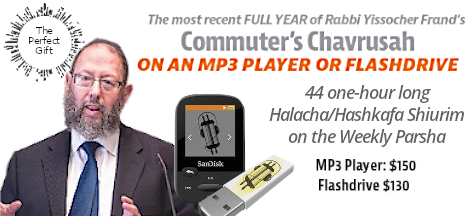

These divrei Torah were adapted from the hashkafa portion of Rabbi Yissocher Frand’s Commuter Chavrusah Series on the weekly portion: #1309 – Dilemma of Day School Rebbi: A Non-Jewish Child in His Class – Can He Teach Him? Good Shabbos!
The Gemara (Avodah Zarah 51a) interprets the term tzadik tamim that is used to describe Noach as tamim (perfect) in his ways and tzadik (righteous) in his activities. Rashi interprets the expression “tamim in his ways” as connoting “modest and humble of spirit” and the expression “tzadik in his activities” as connoting “without chumus” (violence/theft).
We see from this Rashi that the yardstick for proclaiming a person to be a tzadik is his level of honesty regarding dinei mamanos (monetary matters). In a similar vein, the Rambam writes (Hilchos Sechirus 13:7) that a worker needs to serve his employer with all his strength (b’chol kocho). A worker must strive to do an honest day’s work for the pay of that day. As proof for this halacha, the Rambam cites “For the tzadik Yaakov stated (to his wives) ‘for with all my strength, I served your father.’” We are familiar with the description of how hard Yaakov worked and how faithful he was when he worked for Lavan: “…By day, scorching heat consumed me, and frost by night; my sleep drifted from my eyes…” (Bereshis 31:40)
It is noteworthy in this citation from the Mishna Torah that the Rambam does something quite rare: He refers to Yaakov as a tzadik. Yosef is widely referred to as “Yosef Hatzadik“. I did a word search to see where else the Rambam uses the word hatzadik. The Rambam uses it by Yosef Hatzadik. The Rambam also uses it several times in reference to Shimon Hatzadik (the Kohen Gadol and head of the Sanhedrin during the Second Bais Hamikdash). Other than these reference to Yosef Hatzadik and Shimon Hatzadik, this reference to Yaakov Hatzadik is the only other time in all of Mishna Torah that a personality in Tanach or Jewish History merits this title. Apparently, the Rambam’s intention is (like we saw in Rashi above) that Yaakov was called a tzadik because of his outstanding honesty in monetary matters.
The Kav Hayashar (Rav Tzvi Hirsch Kaidanover (1648-1712); Frankfurt) makes this point even more explicitly and dramatically. He writes: “Remember this rule: A person who does not wish to get benefit (even legitimately) from his friend’s money, and certainly a person who goes out of his way to avoid misappropriation of money or theft, and whose business transactions are faithful – is certainly a righteous person and a man of integrity, because the essence of fear (of G-d) and tzidkus relates to money, and someone who is careful about dinei mamanos is a tzaddik gamur (completely righteous person).”
Thus, according to the Kav Hayashar, a tzadik gamur is not defined as someone who davens a long Shemoneh Esrei or someone who refrains from speaking Lashon Harah. Of course, those are very important things. But according to the Kav Hayashar, there is ONE measure of a tzadik gamur and that is a person who maintains his righteousness regarding dinei mamanos.
These statements carry a lot of weight in our day and age.
Cross-Generational Praise:
The parsha says that Noach was perfect and righteous (tzadik tamim) in his generations (plural). The Meshech Chochmah infers that Noach exhibited these two attributes: tzadik and tamim. Tzadik, as we said, meant that he was careful to avoid theft. In the generation prior to the flood (which was full of theft), Noach was distinguished as a tzadik because he did not engage in theft like the rest of humanity. Tamim indicated that he was humble and of lowly spirit. Imagine: Noach walks out of the teivah. He and his family are the only people in the world and it is now up to him to populate the entire world. Out of the entire universe, only Noach was saved by the Ribono shel Olam. How does such a person feel about himself? “I must be someone very special.” Nonetheless, Noach was humble and of lowly spirit. This means that in the generation subsequent to the flood, he was still a tamim, he was still humble.
This is the meaning of “in his generations.” In the generation prior to the flood, he was a tzadik in his monetary conduct and in the generation subsequent to the flood, he was a tamim, meaning he was humble and lowly of spirit. Noach was perfect and righteous in both generations.
Their Decree Was Sealed Over Theft of Less Than a Perutah
The Torah says, “Now the earth had become corrupt before G-d; and the earth had become filled with robbery. And G-d saw the earth, and behold it was corrupted, for all flesh had corrupted its way upon the earth. G-d said to Noach, ‘The end of all flesh has come before Me, for the earth is filled with robbery through them; and behold, I am about to destroy them from the earth.'” (Bereshis 6:11-13)
Besides robbery, the generation of the flood was guilty of many other things as well. They were guilty of idolatry and sexual immorality. However, despite all of that, Rashi writes that their decree was only sealed by virtue of their “chumus” (robbery). They were terribly corrupt and immoral in many ways and yet the straw that broke the camel’s back was their “chumus“.
The Talmud Yerushalmi asks: What is the definition of “chumus” and what is the definition of “gezel“? The Gemara answers that “gezel” involves theft of money worth at least a perutah and “chumus” involves theft of less than a perutah in value. This is amazing. “Chumus” does not mean robbing a bank. “Chumus” means stealing something that may be worth no more than a fraction of a cent! This exacerbates our question. For illicit relations, the decree was not sealed. For adultery, idolatry, and all types of gross immorality, the decree was not sealed. But “chumus” – meaning even less that a perutah’s worth of theft – broke the camel’s back! What does this mean?
I saw an interesting insight in Rabbi Avrohom Buxbaum’s new sefer on Chumash: The lesson is that when a person steals a single pea or a single needle or something worth less than a perutah, he is abusing the legal system because he knows that he can get away with it. If you know you can “get away with it,” you are doomed!
When a person commits adultery, he knows that he is doing something wrong. When a person worships idols, he also knows that he is doing something wrong. There is a sense of guilt. When a person feels guilty, he is close to repentance. Eventually, his conscience will bother him and he will come to the realization that he needs to stop what he has been doing because it is sinful.
When the generation of the flood committed these major aveiros, the Ribono shel Olam was willing to have mercy and wait, in the hope that eventually they would do teshuvah. But when a person does something wrong and he says, “There is nothing wrong with this,” then he is distant from teshuvah. When he is distant from teshuvah, he will never repent. That is why the final decree of the generation of the flood was only sealed over the sin of “chumus“. The Almighty realized that they would never repent for this. When a person tries to abuse the system and “get away with murder” (or whatever it may be), even though technically it may be legal, he knows he is “gaming the system” and he feels that he never did anything wrong. If I feel that I never did anything wrong, I will never feel remorse and I will never do teshuvah.
Transcribed by David Twersky; Jerusalem [email protected]
Technical Assistance by Dovid Hoffman; Baltimore, MD [email protected]
This week’s write-up is adapted from the hashkafa portion of Rabbi Yissochar Frand’s Commuter Chavrusah Series on the weekly Torah portion. A listing of the halachic portions for Parshas Noach is provided below:
- # 027 – The Abortion Controversy
- # 069 – Ma’ariv and Mitzvos in the Land of Midnight Sun
- # 118 – Suicide: Is it Ever Permitted?
- # 165 – Euthanasia
- # 211 – Animal Experimentation
- # 255 – Preventing a Suicide
- # 301 – Teaching Torah to Non-Jews
- # 345 – Milah for Non-Jews: Is it Permitted
- # 389 – Abortion to Save a Baby?
- # 433 – Assisting in a Suicide
- # 477 – Tzedakah and Non-Jews
- # 521 – The Ben Noach & the Nectarine
- # 565 – The Golam
- # 609 – Cosmetic Surgery
- # 653 – The Har Habayis — The Temple Mount in Halacha and Hashkafa
- # 697 – The Case of the Fascinating Ger
- # 741 – Your Wife’s Medical Bills: Who Pays?
- # 785 – Spreading Bad News
- # 829 – Bending the Truth of the Torah
- # 873 – Stem Cell Research
- # 917 – Did Shimshon Commit Suicide?
- # 960 – Geshem Reigns — Mashiv Haruach U’moreed Hageshem? Hagoshem?
- #1004 – Shinui Hashem: Changing the Name of a Choleh
- #1048 – Zichrono Le’vracha: On A Living Person?
- #1091 – V’Sain Tal U’Matar – Starting Too Early?
- #1134 – Are Non-Jews Only Obligated in “The Seven Mitzvos”?
- #1177 – Teaching Torah To A Potential Convert?
- #1221 – Plastic Surgery for Shidduchim Purposes
- #1265 – All You Ever Wanted to Know About the Bracha on a Rainbow
- #1309 – Dilemma of Day School Rebbi: A Non-Jewish Child in His Class – Can He Teach Him?
- #1353 – The Uniqueness of the Hebrew Language
- #1397 – Must One Eat Meat on Shabbos?
- #1441 – Backing Out of a Purchase Agreement – What Are the Consequences?
- #1485 – I just saw a Rainbow – Shall I tell my neighbor?
- #1529 – Teaching Torah to a Potential Convert – Is There a Problem?
- (2022) – Changing the Name of a Choleh – How Does it Help?
A complete catalogue can be ordered from the Yad Yechiel Institute, PO Box 511, Owings Mills MD 21117-0511. Call (410) 358-0416 or e-mail [email protected] or visit http://www.yadyechiel.org/ for further information.


